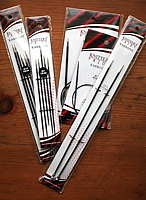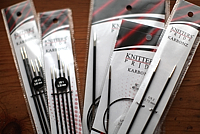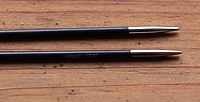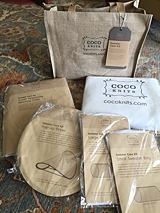
Needle Profile:
Knitter's Pride Karbonz
Back in 2010, I heard about a new miracle material being used for knitting needles. It was a carbon fiber composite also found in Boeing 787 Dreamliners, stealth fighter jets, and Formula One race cars. The benefit? Extraordinarily strong and lightweight, it could be used for very fine needles (down to a size US 0000 [1.25mm]) that wouldn't break. At least not easily.
Up until then, the only viable candidate for such fine needles was steel, brass, aluminum, or nickel-plated brass—essentially smooth, slick, cold metals. But the composite offered a warmer surface, the lightness of wood, and something the other materials couldn't provide: a bamboo-like surface friction to keep your needles from sliding out of their teeny, tiny stitches.
The first carbon fiber composite knitting needles were from Blackthorn and were offered exclusively as DPNs in sizes US 0000 (1.25mm) to US 4 (3.5mm). The needles were six inches long and came in sets of five, with deliciously pointy tips. The needles are still available online and retail for $35 per set.
I ordered two sets back in 2010, I believe. They arrived promptly, but when I took them out of their colorful pouches and ran my finger along the tips, I recoiled as if I'd touched exposed fiberglass. There were no splinters, the surface was completely smooth. But for some reason, that's what my fingers felt. And they did not like it one bit.
When Knitter's Pride showed me their carbon fiber composite needle prototypes at TNNA last year, I had a similar reaction. But then Knitter's Pride decided to change the tip, replacing it with smooth nickel-plated brass. That's when I knew it was time to give carbon fiber composite a second look.
Karbonz
Carbon fiber composite is exactly what it sounds like: a polymer (most often epoxy) that's been reinforced with carbon fibers. (As it turns out, my sensation of touching fiberglass wasn't too far off.) This material offers extraordinary strength while remaining lightweight and warm to the touch.
The Karbonz have a much smoother overall finish than the Blackthorns. This translates into less drag and faster sliding of stitches with the Karbonz, while the Blackthorns may allow more control of slippery yarns, but at a slightly slower pace. The pure composite tip on the Blackthorns is pointy pointy pointy; the nickel-plated brass on the Karbonz is more like a medium-tip rollerball. Still pointy, but not snaggishly so.
There is a faint jump where the tip transitions to the needle. This was my biggest concern with the Karbonz. I tried to force a snag on several sizes and with different yarns, but it didn't happen—my yarn moved easily across the tiny divide between two surfaces.
When you rub the needles together, their microscopic carbon fibers make an empty, rather odd scraping sound, almost like glass. It's much more noticeable in the earlier all-carbon composite needles such as those from Blackthorn. Knitters suggest rubbing the needles with wax paper at first to help break in the needles. The Karbonz make far less of a sound at first, perhaps because of their smoother surface. What you hear most when using these is the faint "tink tink" of the metal tips.
The Offering
Knitter's Pride currently offers Karbonz in DPNs, fixed circulars, and single-pointed straight needles. The fixed circulars and single-pointed straights begin at US 0 (2mm) and run to US 4 (3.5mm), while the DPNs begin at US 000 (1.5mm). I'd love to know why they're sticking to smaller sizes for the needles. Perhaps the carbon fiber composite is too expensive for thicker needles?
I'm also guessing that the finer needle size is why they don't offer these in interchangeable circulars, since their interchangeables begin at US 4. The interchangeable screw mechanism can't get smaller than that.
People with nickel sensitivity have long praised carbon-composite needles, which allow them to use metal-like DPNs at tiny gauges that would snap a wooden needle in a heartbeat. Alas, the nickel-plated brass tips in Karbonz puts them squarely off-limits for folks with nickel sensitivities.
Bottom Line
Knitting needles are like writing utensils. You can pay attention to the nuance and have a different kind of instrument for every situation. Or you can just carry around that Bic ballpoint and never know that there's a difference.
There is a difference. The more you try different needles, swap out one yarn for another, change the kinds of projects and stitches you work with each needle, the more you'll discover just how vast that difference is—and how helpful a simple change of needles can be to the ultimate success of your project.
With that in mind, Karbonz gives us a new reasonably affordable way to experiment with carbon composite needles and see if you like them. If you do, and you happen to knit a lot of socks and love pointy tips, then you can invest in a set of Blackthorns and your arsenal will be truly complete.
Knitter's Pride
Carbon fiber composite
DPNs:
6" or 8" length
US 000 (1.50mm), US 00 (1.75mm), US 0 (2.00mm), US 1 (2.25mm), US 1.5 (2.50mm), US 2 (2.75mm), US 2.50 (3.00mm), US 3 (3.25mm), US 4 (3.50mm)
Fixed circulars:
Cords in 16", 24", 32", 40"
US 0 (2.00mm), US 1 (2.25mm), US 1.5 (2.50mm), US 2 (2.75mm), US 2.50 (3.00mm), US 3 (3.25mm), US 4 (3.50mm)
Single-pointed straights:
10" or 14" length
US 0 (2.00mm), US 1 (2.25mm), US 1.5 (2.50mm) US 2 (2.75mm), US 2.50 (3.00mm), US 3 (3.25mm), US 4 (3.50mm)
$11.95-$14.95 depending on the needle type and size
WEBS
India
2/28/2013
Knitter's Pride






